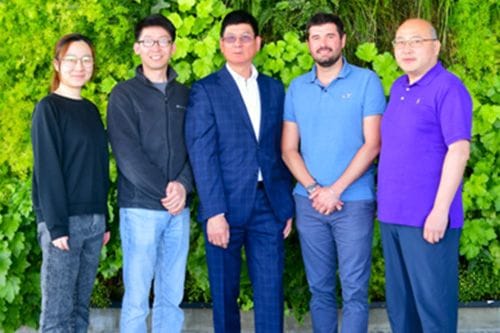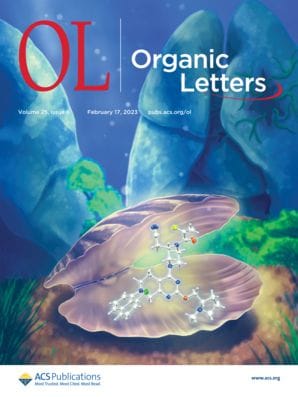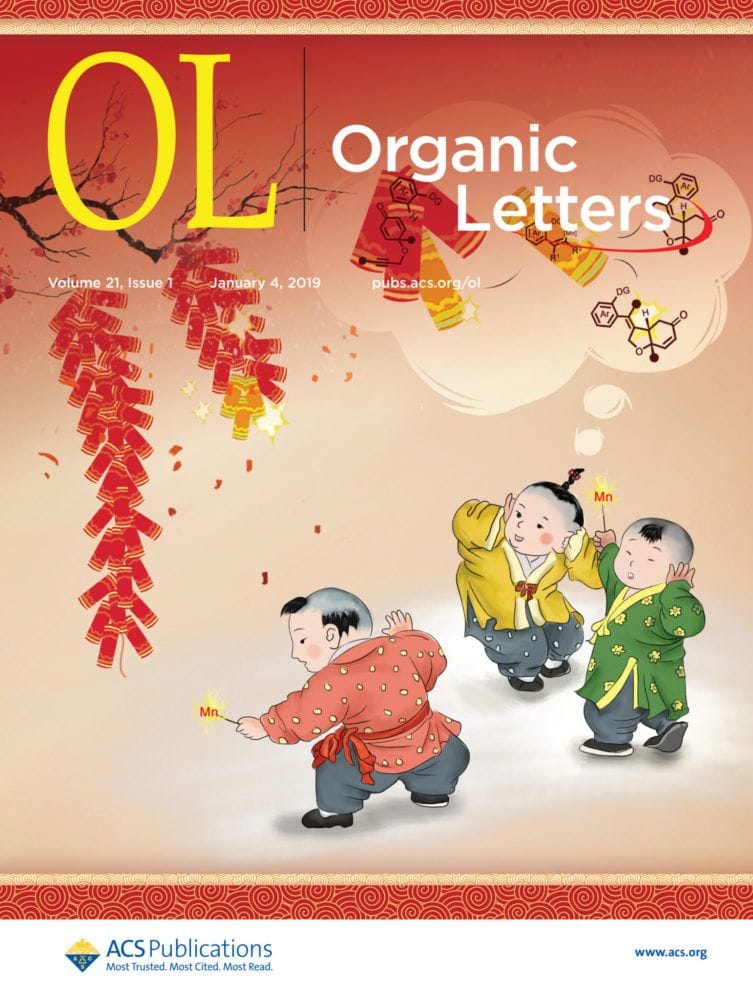Learn more about the team—Cheng-yi Chen, Zhichao Lu, Thomas Scattolin, Chengsheng Chen, Yonghong Gan, and Mark McLaughlin—and read their award-winning research.

Organic Letters, in partnership with the ACS Division of Organic Chemistry, is proud to announce the winners of the 2024 Outstanding Publication of the Year Award:
Cheng-yi Chen, Zhichao Lu, Thomas Scattolin, Chengsheng Chen, Yonghong Gan, and Mark McLaughlin
Mirati Therapeutics, San Diego, United States

This award honors the research team behind an outstanding Letter published in Organic Letters in the preceding year—either in an issue or ASAP—that demonstrates creativity and impact in the field of organic chemistry, broadly based, with a focus on early-career researchers.
Zhichao Lu, Cheng-yi Chen, and colleagues are recognized this year for their article, Synthesis of Adagrasib (MRTX849), a Covalent KRASG12C Inhibitor Drug for the Treatment of Cancer, which describes a concise, transition-metal and protection-free synthesis of Adagrasib, which was approved by FDA in 2022 as a treatment for KRASG12C-mutated solid tumors associated with non-small cell lung cancer.
The research team will be honored during an ACS Division of Organic Chemistry symposium at the ACS Fall Meeting in Denver, Colorado, in August 18-22. Learn more about the Mirati team and their research below.

Synthesis of Adagrasib (MRTX849), a Covalent KRASG12C Inhibitor Drug for the Treatment of Cancer
DOI: 10.1021/acs.orglett.2c04266
Dr. Zhichao Lu is a principal scientist at Mirati Chemical Process R&D at Mirati Therapeutics- a Bristol Myers Squibb company. Dr. Lu, as a process/medicinal chemist, has over 16 years of experience in the chemical synthesis of bioactive molecules. His current interest is in the field of synthetic route scouting, process optimization and implementation of the process towards commercialization.
Dr. Cheng-yi Chen is a Vice President and Head of Chemical Process R&D at Mirati Therapeutics- a Bristol Myers Squibb company, a global biopharmaceutical company focused on discovering, developing, and delivering innovative medicines for patients with serious diseases. He has over 30 years of experience in the pharmaceutical industry, leading and managing chemical process R&D teams and projects across multiple therapeutic areas and stages of development. One particular interest of Dr. Chen is designing, developing and implementing innovative, robust, cost-effective and green manufacturing processes to small molecule drug substances (APIs).
Read an interview with the group
What does this award mean to your group?
It is a great honor to receive this prestigious award. It certainly came as a surprise. Nevertheless, it validated our team’s dedication and commitment to develop robust and scalable synthetic routes to important human medicines while making sure they are sustainable and cost-effective.
How did this team come together to collaborate on this research?
The first scalable route to adagrasib was rapidly put together in response to very promising results from Phase 1 clinical studies. The key objectives were robustness and ability to supply large quantities of quality API for the drug product manufacture and ultimately patients. First-generation synthesis was developed by a remarkably lean team consisting of a healthy mix of industry veterans and talented chemists at the start of their careers.* The process was filed as a new drug application in record time, and used by patients in need since the launch of Krazati in late 2022.
The awarded paper describes successful efforts of Mirati’s process team to address suboptimal features of the first-generation route, such as extensive use of precious-metal catalysis (palladium) and protecting-group manipulations. In the end, without sacrificing robustness and API quality, the need for palladium and protecting groups was completely eliminated. In addition, synthetic efficiency and solvent usage was optimized resulting in much greener and cost-effective approach to this life-saving medicine.
*Findings reported in Organic Process Research & Development.
What new research are you doing to build on the findings you described in your paper?
This paper describes the proof-of-concept of the adagrasib’s second-generation synthesis. To apply it to scaled-up production, a lot of work needed to be done. We are currently working on the process optimization to assure that the scaled-up synthesis can be safely and successfully conducted in the plant. Also, since the majority of the KRAS inhibitor shares a similar core, we are exploring alternatives for other KRAS inhibitor synthesis through this synthetic method.
What would your advice be to someone just starting out in the field?
As a chemist just starting out in the field you can be facing two choices: to go into discovery chemistry or process chemistry as a career. Both are indispensable for bringing new life-changing medicines to patients. Discovery (medicinal) chemists are focused on finding the best molecule. Process (development) chemists are focused on finding the best way to make it. Deciding which one resonates better with you could be an important first step.

